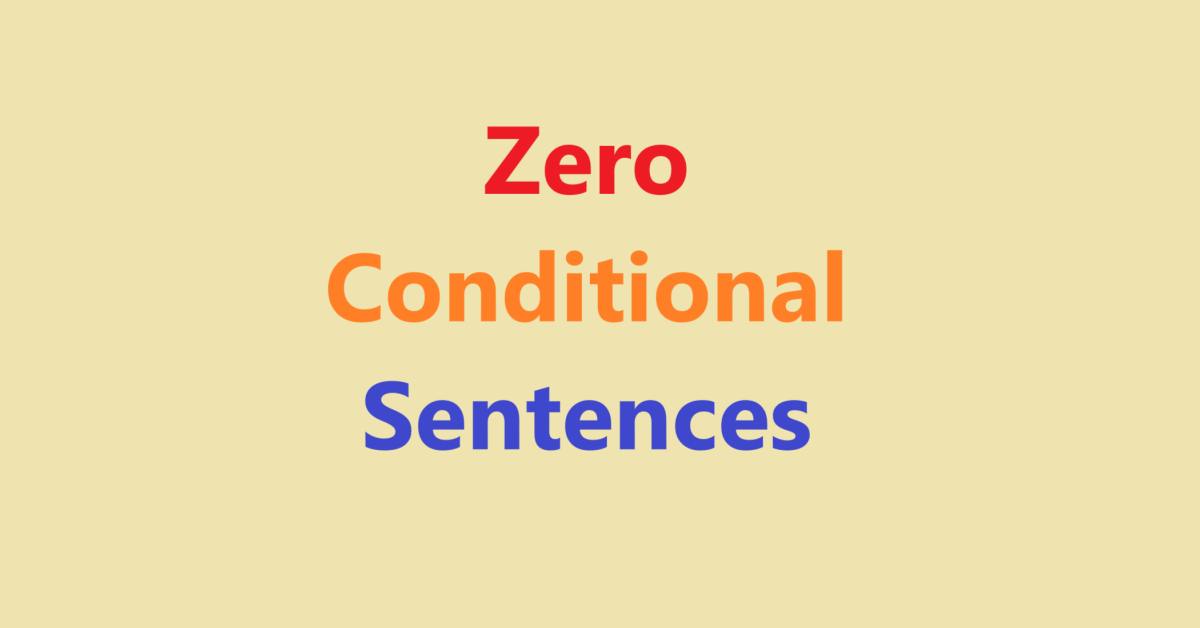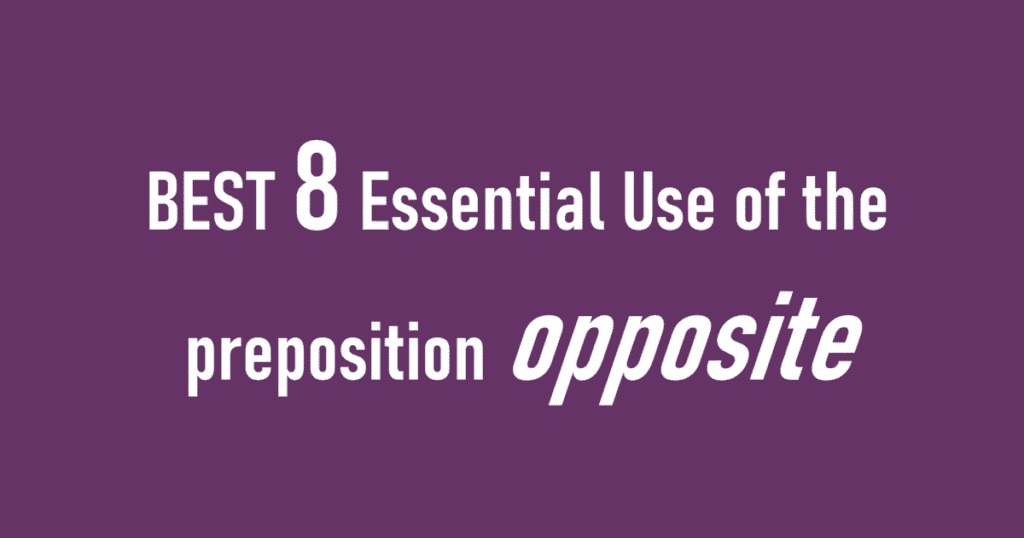Zero conditional sentences in English express general truths, scientific facts, or things that are always true under specific conditions. Here’s a comprehensive overview:
Structure
The zero conditional consists of two clauses:
- If-clause (condition): Present simple tense
- Main clause (result): Present simple tense
Formula:
If + present simple, present simple.
Examples
- If you heat ice, it melts.
- If it rains, the ground gets wet.
- If you mix red and blue, you get purple.
Usage
Zero conditional is used in the following contexts:
- Universal Truths: Facts that are always true.
- If you drop an object, it falls to the ground.
- Scientific Facts: Statements that arise from scientific principles.
- If plants do not get sunlight, they die.
- General Instructions or Habits: Describing repeated actions or behaviors.
- If you touch a flame, it burns.
Special Notes
- No Commas Needed: In a zero conditional, if the “if” clause comes second, there is no need for a comma.
- The ground gets wet if it rains.
- Interchangeability: The clauses can be switched without changing the meaning.
- The earth revolves around the sun if it is not obstructed by other bodies.
Negative Form
You can use negatives in zero conditional sentences:
- If you don’t water plants, they die.
- If it’s not sunny, it doesn’t get warm.
Questions in Zero Conditional
You can also form questions:
- What happens if you mix vinegar and baking soda?
- If you go to bed late, do you feel tired the next day?
Common Mistakes
- Using other tenses: Avoid using tenses other than the present simple in both clauses.
- Incorrect: If you heated water, it boils.
- Correct: If you heat water, it boils.
Summary
Zero conditionals are straightforward and serve to communicate facts and truths that are universally accepted. They’re an essential part of English that helps express clear, cause-and-effect relationships.
Here are some exercises to help you practice zero conditional sentences, along with answers for self-checking:
Exercise 1: Fill in the Blanks
Complete the sentences using the correct form of the verb in parentheses.
- If you ___ (freeze) water, it ___ (turn) into ice.
- If it ___ (be) hot, people ___ (use) fans.
- If you ___ (not eat) breakfast, you ___ (feel) hungry.
- If the sun ___ (shine), it ___ (get) warmer.
- If you ___ (not water) the flowers, they ___ (die).
Answers for Exercise 1:
- freeze / turns
- is / use
- don’t eat / feel
- shines / gets
- don’t water / die
Exercise 2: Rewrite the Sentences
Rewrite the following sentences as zero conditionals.
- When I heat ice, it melts.
- If I heat ice, it melts.
- If it rains, the ground gets wet.
- If it rains, the ground gets wet. (This sentence is already a zero conditional.)
- If you mix yellow and blue, you obtain green.
- If you mix yellow and blue, you get green.
- Plants die when they do not get enough water.
- If plants do not get enough water, they die.
- If you drop a ball, it falls.
- If you drop a ball, it falls. (This sentence is already a zero conditional.)
Exercise 3: Create Your Own Sentences
Create five zero conditional sentences based on the following prompts:
- Use something that happens in nature.
- If the temperature drops below freezing, water turns into ice.
- Use a scientific fact.
- If you heat water to 100 degrees Celsius, it boils.
- Use a habitual action.
- If I wake up late, I skip breakfast.
- Use a general instruction.
- If you push the button, the machine starts.
- Use a common saying or proverb.
- If you mix red and white, you get pink.
Exercise 4: Multiple Choice
Choose the correct answer for each zero conditional sentence:
- If it _______ (rain/rains), the park gets muddy.
- a) rain
- b) rains
- If you _______ (touch/touching) fire, it _______ (burns/burn) you.
- a) touch / burns
- b) touching / burn
- If people _______ (not feed) animals, they _______ (get) hungry.
- a) don’t feed / get
- b) not feed / get
Answers for Exercise 4:
- b) rains
- a) touch / burns
- a) don’t feed / get
Exercise 5: Match the Clauses
Match the two halves of the sentences correctly.
- If you add salt to water,
- If it snows,
- If you touch a cactus,
- If you multiply any number by zero,
- If you recycle paper,
a. it gets wet.
b. it will not feel good.
c. the temperature drops.
d. it equals zero.
e. you save trees.
Answers for Exercise 5:
1 – a: If you add salt to water, it gets wet.
2 – c: If it snows, the temperature drops.
3 – b: If you touch a cactus, it will not feel good.
4 – d: If you multiply any number by zero, it equals zero.
5 – e: If you recycle paper, you save trees.
Exercise 6: Identify the Error
Each of the following sentences has one mistake. Identify and correct the mistakes related to zero conditional forms.
- If you mix hydrogen and oxygen, you creates water.
- If the sun shine, it warms the planet.
- If you not water plants, they die.
- If it rains, the streets get wet.
- If you heat metal, it expand.
Answers for Exercise 6:
- Correct: If you mix hydrogen and oxygen, you create water.
- Correct: If the sun shines, it warms the planet.
- Correct: If you don’t water plants, they die.
- Correct: If it rains, the streets get wet. (This sentence is already correct.)
- Correct: If you heat metal, it expands.
Exercise 7: Fill in the Blanks (with Context)
Complete the sentences with appropriate verbs using the zero conditional.
- If the alarm clock _______ (ring), I _______ (get up).
- If you _______ (freeze) water, it _______ (turn) into ice.
- If I _______ (not water) my plants, they _______ (die).
- If the light _______ (turn) red, cars _______ (stop).
- If you _______ (heat) chocolate, it _______ (melt).
Answers for Exercise 7:
- rings / get up
- freeze / turns
- don’t water / die
- turns / stop
- heat / melts
Exercise 8: Create Sentences in Context
Write zero conditional sentences based on the scenarios given.
- Cooking: What happens when you overcook pasta?
- If you overcook pasta, it becomes mushy.
- Health: What occurs when you don’t get enough sleep?
- If you don’t get enough sleep, you feel tired.
- Weather: What happens in summer?
- If it is summer, the days are longer.
- Physics: What occurs when you throw a ball up?
- If you throw a ball up, it comes back down.
- Technology: What happens if you plug in your phone?
- If you plug in your phone, it charges.
FAQs on Zero Conditional Sentences
Here are some frequently asked questions (FAQs) about zero conditional sentences, along with clear answers:
1. What is a zero conditional sentence?
A zero conditional sentence expresses general truths, facts, or situations that are always true when a certain condition is met. It consists of an “if” clause and a main clause, both typically in the present simple tense.
2. What structure does a zero conditional sentence follow?
The structure of a zero conditional sentence is:
If + present simple, present simple.
For example: If you heat water, it boils.
3. When should I use zero conditional sentences?
You should use zero conditional sentences to talk about:
- Universal truths or facts (e.g., “If you drop an object, it falls.”)
- Scientific facts (e.g., “If you mix red and blue, you get purple.”)
- Habits or general instructions (e.g., “If children stay up late, they get tired.”)
4. Can I use other tenses in zero conditional sentences?
No, zero conditional sentences strictly use the present simple tense in both clauses. Incorrect usage, such as using past or future tenses, is not acceptable in this structure.
5. What is the difference between zero conditional and first conditional?
- Zero Conditional: Used for facts and truths (e.g., “If you heat ice, it melts.”)
- First Conditional: Used for real and possible situations in the future (e.g., “If it rains tomorrow, I will stay home.”)
6. Can the clauses of a zero conditional sentence be reversed?
Yes, the “if” clause and the main clause can be reversed in zero conditional sentences without changing the meaning. For example:
- If it rains, the ground gets wet. is the same as The ground gets wet if it rains.
7. Are there any negative forms of zero conditional sentences?
Yes, zero conditional sentences can use negative forms. For example: If you don’t water the plants, they die. The structure remains the same, with the negation applied to the “if” clause.
8. Can I use zero conditional for hypothetical situations?
No, zero conditional sentences are not used for hypothetical or unreal situations. They strictly refer to situations that are always true when the condition is met. For hypothetical situations, you would use the second or third conditional forms.
9. How can I practice zero conditional sentences?
You can practice zero conditional sentences through various exercises, such as:
- Filling in the blanks
- Matching clauses
- Creating your own sentences based on prompts
- Rewriting sentences to ensure they follow the zero conditional structure
10. Is it necessary to include the comma in zero conditional sentences?
If the “if” clause comes first, a comma is required before the main clause. If the order is reversed, no comma is needed. For example:
- If it rains, the ground gets wet.
- The ground gets wet if it rains. (No comma needed here.)

